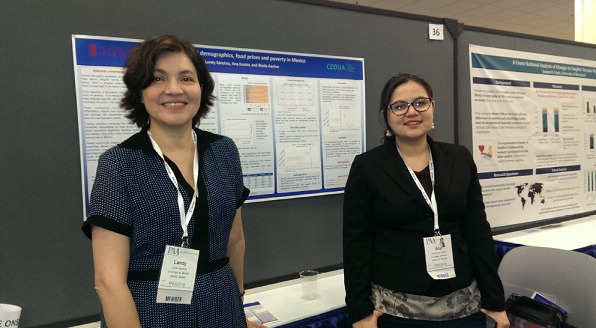The project ended in November 2018 with three main goals accomplished, including: (1) a better understanding of the heterogeneity of household impacts and responses to food and energy constraints; (2) developed national scenarios of climate change impacts; and (3) contribution to building capacity on the study of social implications of climate change. Through research, publications of multiple papers (6 peer-reviewed journal articles, 2 peer-reviewed book chapters) and 21 technical presentations, the project explored how household sociodemographic characteristics shape their response to increments of food and energy prices. Analysis of scenarios allowed the project team to evaluate the impact of climate change in agricultural productivity and its derived effect on consumption and income. Results show negative impacts on population wellbeing for Mexico, more substantial than in most other regions of the world. The detrimental effect on consumption and income, according to the PI, is similar across socioeconomic scenarios, but population groups fare differently, with urban household being the most affected. In the mid-term future (2030-2050), mitigation adds to the negative impacts of climate due to increased energy prices. Urban households experience the largest total losses in food and energy consumption because of their higher intake levels and because of the structure of their consumption: they are mostly food net buyers and still rely heavily on fossil fuels. The results of the research, according to the PI, support the need for developing a social policy to protect households from the effects of climate change and the need to understand the population subgroups that will benefit the most from it.
The project strengthened the study and understanding of the social dimension of climate change. First, it fostered the abilities of the Mexican research team, and it contributes to improving the curricula of graduate courses in urban and population studies. Second, it helped to develop research networks among Mexican academics on issues of household environmental behavior and climate change distributive impacts.
As a direct result of the PEER project, a group of Mexican researchers began to collaborate in studying the social dimensions of climate change, particularly those linked to food security and poverty, and Prof. Sanchez was appointed Chair of the Environment Research Network of the Latin American Association of Population Studies (2018-2020). Now that the project has ended, the team still needs to publish the climate change scenarios results as the manuscripts are being finalized for submission. The PI will keep working on the distributional impacts of climate change by considering a) changes on household structures; b) assessing the effect of higher public transfers and lower inequality between rural and urban settings. For that matter, the PI will employ macro-micro simulation methods, where scenarios results will be combined with household survey data. Datasets and documentation are available at https://climapob.colmex.mx/
Peer reviewed publications and proceedings:
Escoto, A y Sánchez, L “Índice Ponderado de Consumo de Electrodomésticos (IPCE): una propuesta de medición a partir de datos de encuesta en hogares para México” Realidad, Datos y Espacio, Inegi (accepted, forthcoming)
Sánchez Landy y Ana Escoto (2018) Sánchez, “Desigualdades en el consumo energético de los hogares en México” en Lezama (coord) Cambio Climático, ciudad y gestión Ambiental, El Colegio de México, México, D.F
Escoto Castillo, A.; Sánchez Peña, L.(2017) Diffusion of Electricity Consumption Practices in Mexico. Soc. Sci. 2017, 6, 144.
Ana Escoto, Landy Sánchez & Sheila Gachuz. (2017) “Trayectorias Socioeconómicas Compartidas (SSP): una nueva manera de comprender el cambio climático” Revista de Estudios Demográficos y Urbanos, Núm. 96, septiembre-diciembre 2017
Escoto, Ana, Landy Sánchez & Gabriela Pérez. “Hogares y consumo de energía eléctrica en México”, Revista Espinhaço, 2016, 5(2): 30-43
Sánchez Peña, Landy (2016) “Ingresos y consumo energético de los hogares en el Distrito Federal” en: Aguilar, Adrián Guillermo, La Ciudad de México en el Siglo XXI, SECITI- Miguel Ángel Porrúa, D.F.,
Sánchez Peña, Landy (2015) “Sustentabilidad y equidad: reflexiones en torno a la agenda latinoamericana post 2015” R. bras. Est. Pop., Rio de Janeiro, v.32, n.3, p.599-607, set./dez. 2015
Sánchez Peña, Landy (2015) “Integrando la sustentabilidad a las metas de desarrollo”; Coyuntura Demográfica No. 8; México, D.F. p. 81-89
Journal References:Escoto Castillo, A.; Sánchez Peña, L.(2017) Diffusion of Electricity Consumption Practices in Mexico. Soc. Sci. 2017, 6, 144.
Ana Escoto, Landy Sánchez & Sheila Gachuz. (2017) “Trayectorias Socioeconómicas Compartidas (SSP):
una nueva manera de comprender el cambio climático” Revista de Estudios Demográficos y Urbanos, Núm. 96, septiembre-diciembre 2017
Escoto, Ana, Landy Sánchez & Gabriela Pérez. “Hogares y consumo de energía eléctrica en México”, Revista Espinhaço, 2016, 5(2): 30-43
Book references and other research outputs:Sánchez Landy y Ana Escoto (2018) Sánchez, “Desigualdades en el consumo energético de los hogares en México” en Lezama (coord) Cambio Climático, ciudad y gestión Ambiental, El Colegio de México, México, D.F
Sánchez Peña, Landy (2016) “Ingresos y consumo energético de los hogares en el Distrito Federal” en: Aguilar, Adrián Guillermo, La Ciudad de México en el Siglo XXI, SECITI- Miguel Ángel Porrúa, D.F.,Landy Sánchez, Cambio climático y desigualdades emergentes en México, Editorial Post. Animal Politico,
https://www.animalpolitico.com/blogueros-blog-invitado/2018/06/12/cambio-climatico-y-desigualdadesemergentes-en-mexico/
Landy Sánchez, Cambio climático. Informe Desigualdades en México 2018. El Colegio de México-BBVA. Mexico City




